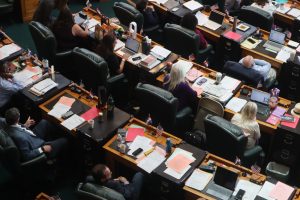What happened during Colorado’s six-day special session sprint? Here’s everything you need to know.
Lawmakers’ return to the Capitol centered around plugging a budget hole caused by Trump’s ‘big, beautiful bill.’ But that wasn’t all they did.
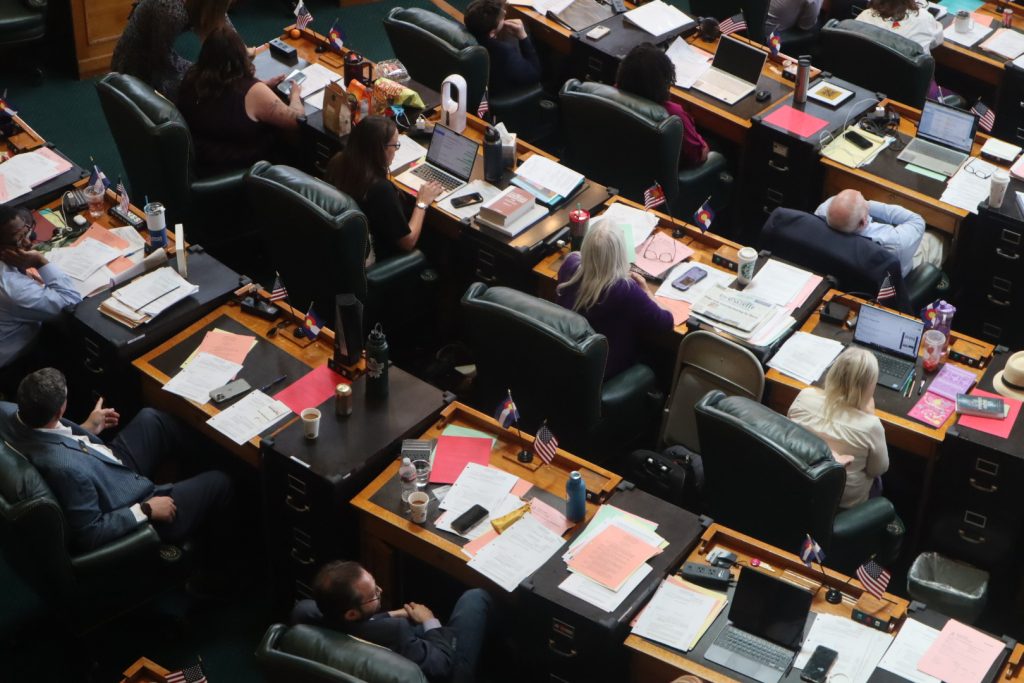
Robert Tann/Summit Daily News
Colorado lawmakers earlier this week wrapped up their third consecutive special legislative session, an event that is beginning to feel less special.
After meeting in August 2023 and 2024 to pass property tax relief measures, the legislature reconvened once again this month for what some have started calling the “summer session,” this time to respond to the fallout of congressional Republicans’ and President Donald Trump’s sweeping tax bill.
Lawmakers passed nearly a dozen bills during their six-day session, which began on Aug. 21 and ended on Tuesday, Aug. 26. But before looking at what those policies are, here’s a reminder of why they met in the first place:
An immediate budget hole
State lawmakers had seen a special session coming for a while.
Efforts by Republicans in Washington to extend and expand a suite of tax cuts passed during Trump’s first term, and to pare back federal spending on social safety net programs, kicked off at the beginning of this year.
The result was H.R. 1, which Trump called his “big, beautiful bill,” an 870-page piece of legislation that, among many things, rewrote the federal tax code to provide more tax cuts to individuals — particularly higher earners — and corporations. It was signed into law on July 4.
Colorado was uniquely susceptible to the tax changes. It is one of just four states that do two things: Use federal taxable income to determine people’s state taxes, and have “rolling conformity” with federal tax law, meaning tax code changes go into effect immediately in the state.
Because of that, the tax cuts passed in Trump’s bill instantly reduced state tax revenue for this current fiscal year by about $1.2 billion. The drop in revenue meant the state fell below the spending cap set in place under the Taxpayer’s Bill of Rights, or TABOR, a 1992 voter-approved amendment to the Colorado Constitution.
That meant lawmakers didn’t have to refund that excess money, bringing the true deficit to around $783 million, according to a projection from the governor’s office of State Planning and Budgeting.
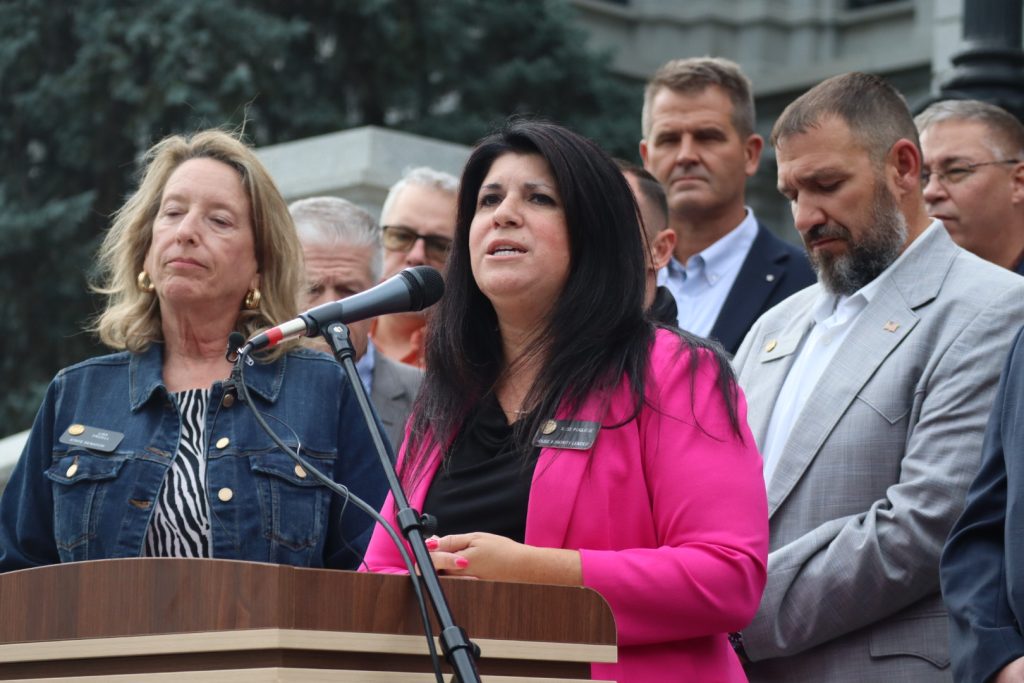
The budget hole is different from the ongoing budgetary challenges Colorado faces, which are caused by several factors, like increased spending on certain services and TABOR constraints. The state was already projected to face deficits in future years, regardless of the federal tax bill.
However, the current fiscal year budget that was passed by lawmakers this spring, and which took effect on July 1, was deficit-free until the “big, beautiful bill” became law just a few days later.
Colorado’s constitution requires lawmakers to have a balanced budget every year, and so Gov. Jared Polis called them back for a special session to help close the gap. Legislators also used the session to deal with other impacts of the federal tax law, including less funding for food assistance and expiring health insurance subsidies.
Here’s a look at what was passed:
Tax changes generate $250 million for the state
The special session’s centerpiece was a package of tax bills passed by Democrats, who sought to raise revenue to help close around a third of the budget shortfall.
Taken together, Democrats believe the measures will raise roughly $250 million in revenue for the current fiscal year. Those bills were:
- House Bill 1, which permanently extends a requirement for non-corporate business owners to add back a federal qualified business income deduction when calculating their Colorado taxes. The add-back applies to taxpayers with an adjusted gross income over $500,000 or over $1,000,000 for joint filers. Extending the add-back is expected to generate nearly $46 million in revenue for the state this fiscal year.
- House Bill 2, which expands the list of countries where corporations may be shielding some of their income tax. The bill is expected to generate $35.6 million in revenue this fiscal year.
- House Bill 3, which repeals a tax incentive for insurance companies that have a “home office” or “regional home office” in Colorado. That is defined as a company that has at least 2.5% of its domestic employees in Colorado. Repealing the incentive, which provides a reduced insurance premium tax rate, is expected to generate $44.1 million in revenue this fiscal year.
- House Bill 4, which allows insurance companies and C corporations to prepay their taxes earlier at an up to 20% discount through the sale of tax credits through the 2033 tax year. This means the state will sell a credit that is worth as little as 80 cents on the dollar. Companies that buy the credits will be able to redeem them later, meaning the state will pay back a dollar for every 80 cents it took in taxes. The measure is expected to raise about $100 million this fiscal year, with the state on the hook to pay back up to $125 million in later years.
- House Bill 5, which eliminates the state “vendor fee,” a 90-year-old policy that allows small businesses to keep 4%, or up to $1,000, of sales tax that they collect and remit to the state each filing period. It is expected to generate $27.6 million in revenue this fiscal year.
Republicans opposed all five bills, arguing that the measures amount to a violation of TABOR, which requires voter approval for any state-level tax changes that raise revenue for the state.
“Any time you’ve got to write a bill to change tax policy, that would be a tax policy change,” said Sen. Barbara Kirkmeyer, R-Brighton.
Kirkmeyer, who sits on the legislature’s Joint Budget Committee, said she thinks HBs 1 and 3 are especially vulnerable to legal challenges.
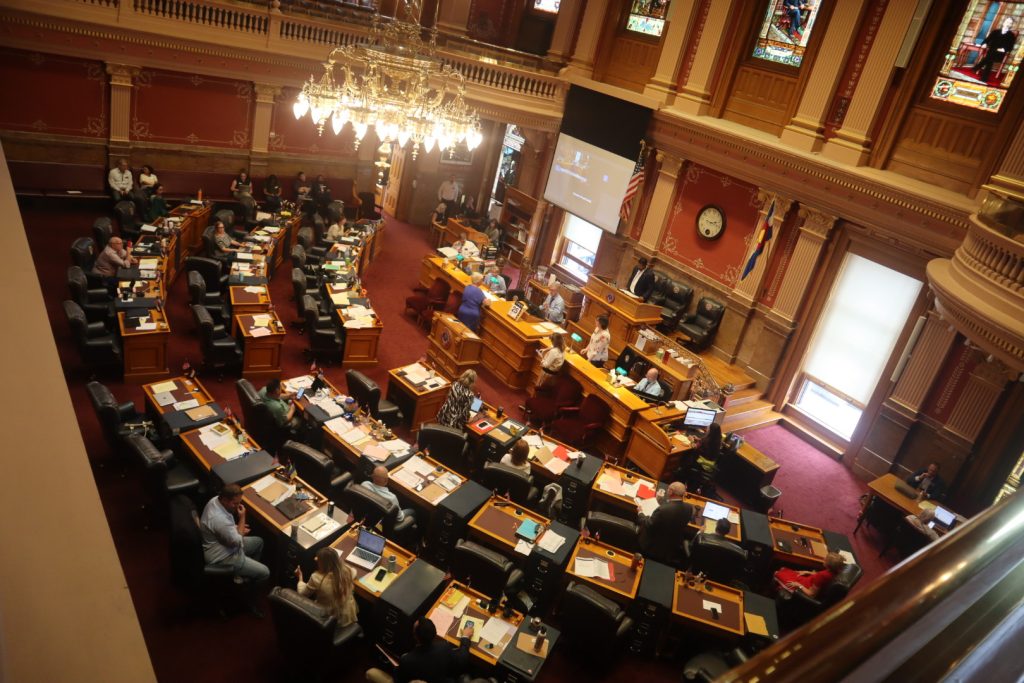
Democrats have defended the bills as being constitutionally sound.
“We developed them in concert with the executive branch, with advisement from the attorney general’s office (and) folks who look at TABOR and these cases,” said Sen. Mike Weissman, D-Aurora.
TABOR “does not mean every corporate tax loophole is locked in stone. It does not mean that we have to stand back while corporations park money in overseas havens,” Weissman said. “Outside parties always have the right to test what we do in court. That’s the way our government works, but we believe we’re on firm ground.”
Legislature punts spending cuts to Polis
The tax changes still leave roughly two-thirds of the state’s budget hole unfilled.
The legislature did not approve any spending cuts during the special session; instead, they passed a bill that will empower the governor to make those cuts after first consulting with the Joint Budget Committee.
Currently, the governor can, through executive orders, pause or cut state spending when the current fiscal year’s budget has a shortfall.
Senate Bill 1 requires the governor’s team to meet with the budget committee to discuss any planned spending cuts in instances where reserve funds need to be tapped that will equal up to 3% of the general fund, or if the reserve will fall below $1 billion.
The state’s reserve currently sits at around $2.3 billion, which equates to 15% of the general fund budget.
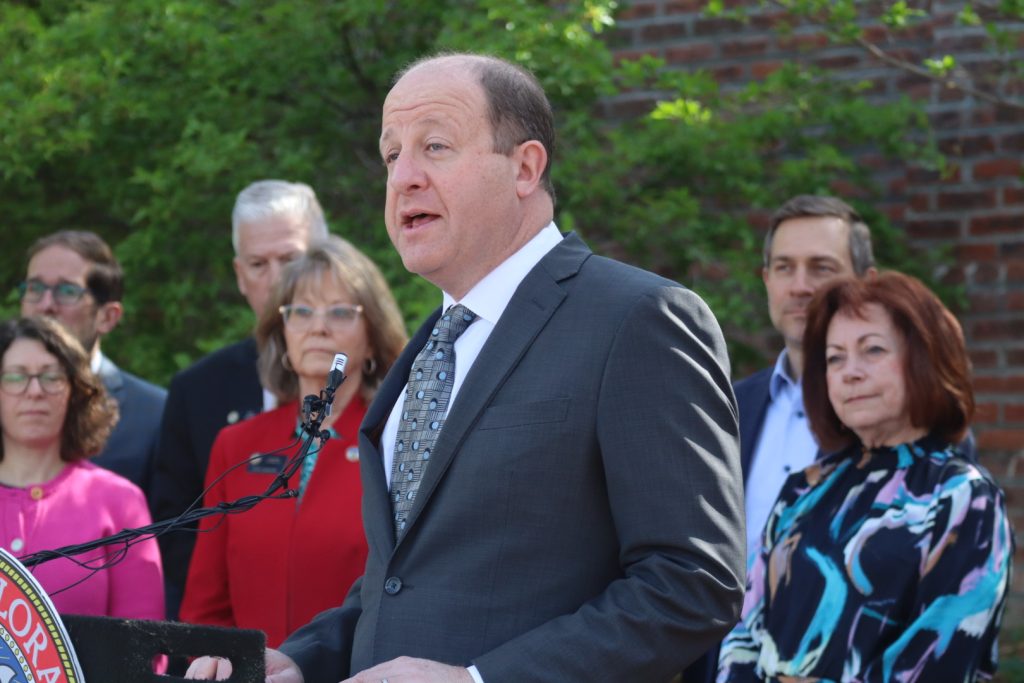
Polis on Thursday unveiled plans to cut about $102 million in current state spending, while redirecting another $147 million in funds from other accounts into the state general fund. He will also use around $325 million of state reserves to close the funding gap, which will leave the rainy day fund equal to about 13% of the general fund.
The single largest injection into the general fund will come from Proposition 123 funds, which provide financial opportunities to help local communities build affordable housing. Polis plans to use $105 million of that money.
He will also cut Medicaid reimbursement rates by about $38 million, along with reducing spending on higher education. Polis said his plan will not touch K-12 funding, an especially delicate political topic after the legislature committed to a plan last year to enhance public education spending.
The cuts will go into effect on Sept. 1, except for the changes to Medicaid rates, which will happen in October.
Polis has also issued a hiring freeze for all state employees that’s been in effect since Aug. 22 and will last through the end of this year.
Lawmakers seek to get ahead of health insurance ‘crisis’
Running parallel to the budget debate were efforts to stave off some of the impacts on safety net programs as a result of actions, or inactions, in Trump’s tax bill.
One of the most immediate impacts is an expected surge in health insurance premiums next year for people who aren’t covered through their employer. Average premiums on the individual marketplace, called Connect for Health Colorado, are projected to cost 28% more statewide, and 38% more on the Western Slope, in 2026.
That’s due to the looming expiration of Biden-era insurance subsidies, called the enhanced premium tax credit, which is set to lapse at the end of this year. Trump’s bill did not renew the credits.
To blunt some of the cost increase and help keep more people covered, Democrats approved House Bill 6, which pumps $110 million into the state’s Health Insurance Affordability Enterprise.
The fund supports initiatives aimed at limiting health insurance cost increases, such as the reinsurance program, which covers a portion of high-cost claims, and OmniSalud, which subsidizes insurance plans for undocumented immigrants who can’t buy on the individual marketplace.
The $110 million would come primarily from the sale of tax credits to insurance companies and C corporations that were approved through HB 4. That revenue is separate from the money also being used to close the budget gap.
Democrats say the measure will be able to hold premiums to a 20% average statewide increase next year, rather than 28%, and protect coverage for at least 20,000 of the 100,000 people who could be at risk of dropping their plans.
Republicans largely opposed the bill, saying the reliance on tax credits as a funding source is flawed because the state will have to pay back even more in future years.
“I don’t think it was the right answer this go around,” said Sen. Marc Caitlin, R-Montrose. “We’re taking a short-term fix.”
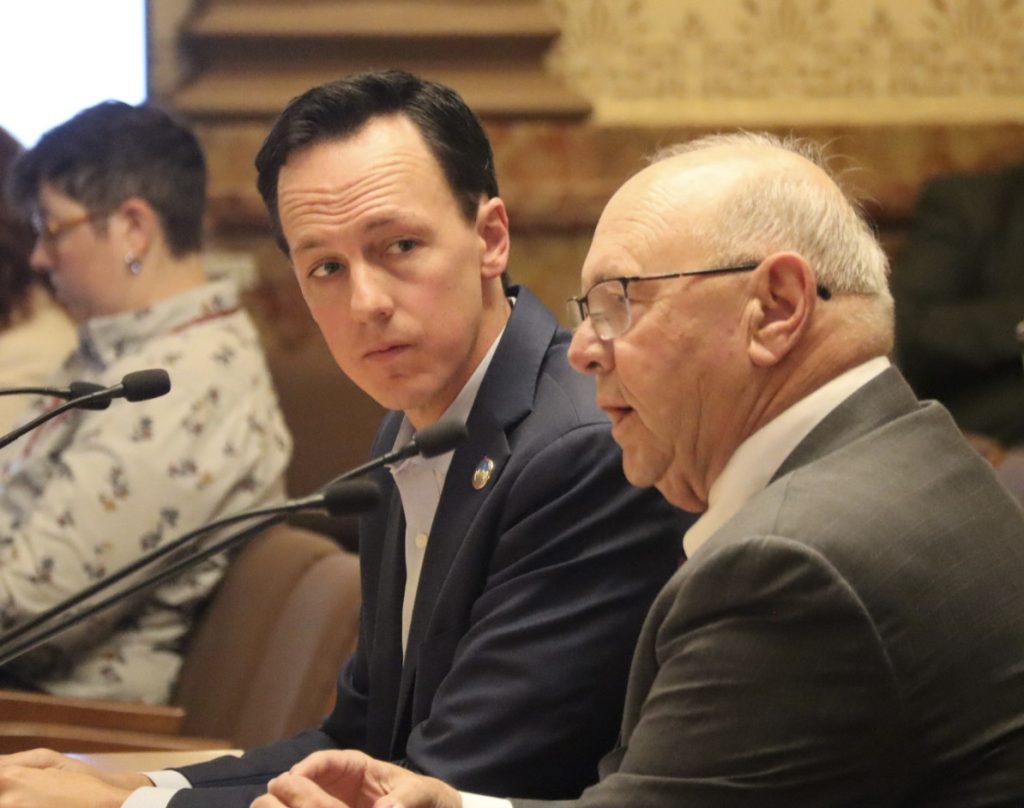
Sen. Dylan Roberts, D-Frisco, whose Western Slope district neighbors Caitlin’s, said the measure will still be important to High Country communities that face some of the highest health care costs in the country.
“We are facing a crisis in our state this fall when people start to get their insurance rates and their bills for their new insurance plans that start on Jan. 1,” Roberts said. “(HB 6) is going to help. It’s going to help keep some of those increases in check. It’s going to help provide some assistance across the state.”
Caitlin and Roberts did partner on another bill to increase funding for health insurance subsidies by redirecting $264,000 from the state’s wolf reintroduction program.
That figure represents roughly what Colorado Parks and Wildlife spent on wolf reintroduction last year when adjusted for inflation, Roberts said. Initially, the bill would have also prohibited Parks and Wildlife from using its remaining funds to capture and reintroduce new wolves next year, but that provision was stripped from the bill.
The measure, Senate Bill 5, was the only bill led by both a Democrat and a Republican to pass during the special session.
Democrats also shepherded through a bill to ensure access to Planned Parenthood after the federal tax bill blocked federal Medicaid funding from covering those services. Senate Bill 2 uses state Medicaid funds to cover access for Medicaid recipients.
Bill aims to protect SNAP amid funding loss
Another safety net protection measure, Senate Bill 3, updated the language of a ballot question that will appear on voters’ ballots this November.
The ballot question asks voters to allow the state to keep more income tax revenue to fund the Healthy School Meals for All program, which provides free breakfast and lunch for school children.
Insert: Students.jpg
The amendment passed by lawmakers allows some of that additional money, if approved, to also go to the state’s Supplemental Nutrition Assistance Program, which is set to lose some federal funding under Trump’s tax bill.
The state would only use the additional money to fund SNAP after the school meals program has been sufficiently funded.
AI compromise collapses
While the main driver of the special session was the “big, beautiful bill,” much of lawmakers’ attention was also taken up by negotiations over the state’s AI law that passed in 2024.
The measure seeks to prevent discrimination in areas like employment, education and health care that may result from AI-driven algorithms.
While Polis signed that bill last year, he also asked for changes to be made that would assuage concerns from local leaders and the business community about its implementation. Polis asked lawmakers to tamper with the bill when he called the special session.
For days, sponsors of the original measure were engaged in private negotiations with stakeholders, including consumer advocates, the tech industry, labor and education groups. A tentative deal on how to reform the law, however, fell apart.
On the special session’s final day, lawmakers passed an extension of the bill’s implementation date from February to June 2026 in a bid to give themselves more time to work out issues during the regular session that runs from January to May.

Support Local Journalism

Support Local Journalism
As a Summit Daily News reader, you make our work possible.
Summit Daily is embarking on a multiyear project to digitize its archives going back to 1989 and make them available to the public in partnership with the Colorado Historic Newspapers Collection. The full project is expected to cost about $165,000. All donations made in 2023 will go directly toward this project.
Every contribution, no matter the size, will make a difference.

